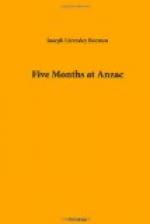The 2nd Field Ambulance was to take our position on the beach. We packed up our panniers and prepared to leave the spot where we had done so much work during the last three months, and where we had been the unwilling recipients of so much attention from Beachy Bill and his friend Windy Annie. Our donkeys carried the panniers, and each man took his own wardrobe. Even in a place like this one collects rubbish, just as at home, and one had to choose just what he required to take away; in some cases this was very little, for each had to be his own beast of burden. Still, with our needs reduced to the minimum, we looked rather like walking Christmas-trees. The distance to Rest Gully was about a mile and a half, through saps and over very rough cobble-stones, and our household goods and chattels became heavy indeed before we halted; I know mine did.
THE ATTEMPT ON SARI BAIR
Our Ambulance was attached to the Left Assaulting Column, which consisted of the 29th Indian Brigade, 4th Australian Infantry Brigade, Mountain Battery and one company of New Zealand Engineers under Brigadier-General Cox.
The commanding officers of all the ambulances in General Godley’s Division met in the gully and had the operation orders explained to them by the A.D.M.S. of the Division, Colonel Manders, a very capable officer. To my great regret he was killed two days later; we had been acquainted for some time, and I had a great regard for him.
The 4th Infantry Brigade was to operate in what was known as the Aghyl Dere (Dere in Turkish means “gully"). The operation order gave out that we were to establish our Field Hospital in such a position as to be readily accessible for the great number of wounded we expected. Meantime, after making all arrangements for the move and ascertaining that each man knew his job exactly, we sat about for a while. The bombardment was to commence at 5 p.m. Precisely at that hour the Bacchante opened fire, the howitzers and our field guns co-operating, the Turks making a hearty response. The din was frightful. To make a man sitting beside me hear what I was saying, I had to shout at the top of my voice. However, there were not many men hit. We had tea—for which Walkley had got three eggs from somewhere, the first I had tasted since leaving Egypt. We tried to get some sleep, but that was impossible, the noise being so great; it was hard, too, to know where one was safe from bullets. Mr. Tute, the Quartermaster, and I got a dug-out fairly well up the hill, and turned in. We had not been long there when a machine-gun appeared to be trained right on to us—bullets were coming in quantities. It was pitch-dark, so we waited until they stopped, and then got further down the gully and tried to sleep there—but this particular dug-out had more than ourselves in it, and we passed the night hunting for things. The Division started to march out just after dark,




